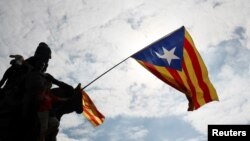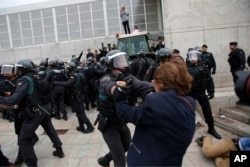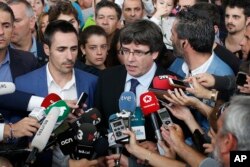It took more than 24 hours before the European Commission spoke out about Sunday’s violence during an independence referendum in Spain’s northeast province of Catalonia, where a violent crackdown in a bludgeoning show of force, by Spain’s national police and Civil Guard, left more than 800 people injured.
The statement Monday did not please Catalan separatists.
“We call on all relevant players to now move very swiftly from confrontation to dialogue,” Europe’s top body announced. “Violence can never be an instrument in politics,” it said.
To the anger of secessionists, the commission added a supportive note for Spain’s embattled center-right prime minister, Mariano Rajoy, saying it trusted him “to manage a difficult process, respecting both the Spanish Constitution and the rights of citizens.”
'An internal matter'
Catalan separatists had hoped the police crackdown ordered by Madrid on those trying to vote in the unsanctioned poll would spur EU leaders to intervene directly in their escalating dispute with the national government in Madrid.
There are little signs Brussels wants to become ensnared in a crisis some fear might plunge into even greater violence, if Catalan separatists follow through on their pledge to announce independence for the restive province within 48 hours. In its statement Monday, the executive body said, “For the European Commission, as President [Jean-Claude] Juncker has reiterated repeatedly, this is an internal matter for Spain that has to be dealt with in line with the constitutional order of Spain.”
Analysts say Sunday’s violence has prompted alarm across the bloc with EU officials worrying the show of strength by Spain’s national police and Civil Guard will have the effect of fueling radical separatism in other countries, too.
Other would-be secessionists
At the same time, EU leaders fear that intervening will encourage separatists elsewhere to look to Brussels for help and invite appeals from other would-be secessionists — Flemish in Belgium, Basques in Spain or a host of others in a complicated patchwork of ethnicities spread out across a continent that can ill afford the stitching being unpicked.
Before Sunday’s independence poll, which Spain's government and constitutional court declared illegal, European officials privately expressed misgivings about the angry standoff between Madrid and the Catalan separatists. Senior figures in Brussels repeatedly criticized the Catalan independence bid publicly.
Behind the scenes, they worried Rajoy was misjudging the determination and fervor of the separatists. They hoped he would defuse the crisis, avoid the courts, and offer dialogue and concessions in a bid to sidestep a confrontation the secessionists appeared eager to engineer.
Many other challenges
Now, the European Union faces a serious constitutional and political crisis in its fifth largest member country at a time when it is already grappling with Brexit, immigration challenges from members Poland and Hungary, and Russian assertiveness on Europe’s eastern borders.
EU member governments publicly are maintaining their support for Madrid or remaining conspicuously silent.
Only the prime ministers of Belgium and Slovenia have expressed clear public disapproval of Madrid’s resorting to force. Charles Michel, Belgium’s prime minister, tweeted Sunday, “Violence can never be the answer! We condemn all forms of violence and reaffirm our call for political dialogue.”
Opposition leaders from Spain’s European neighbors have felt less constrained and urged their national leaders to denounce Sunday’s police actions, which Germany’s Social Democrat leader Martin Schulz described as a “worrying” escalation.
Britain’s Labour leader, Jeremy Corbyn, called for the British government to “appeal directly to Rajoy to end police violence in Catalonia and find a political solution to this constitutional crisis.” Scotland’s First Minister Nicola Sturgeon, whose Scottish Nationalist Party sent observers to monitor the referendum, tweeted, “A true friend of Spain would tell them today’s actions [are] wrong and damaging.”
In the face of media criticism and condemnation by Europe’s opposition politicians, the Spanish government has not wavered, asserting the referendum was illegal and it had been forced to take action by a separatist Catalan government it alleges was mounting a coup. And there are no signs Rajoy is planning to soften his stance. He has blamed the violence on “those who violated the law.”
It doesn’t look as if the Catalan separatists intend to let the European Union off the hook. Carles Puigdemont, the head of Catalonia’s regional government, made it clear Monday he wants to involve the bloc in the standoff between Madrid and Barcelona.
Puigdemont said he would appeal to Brussels to look into alleged human rights violations during Sunday's vote. Puigdemont added he will also be looking to the European Union to assist in negotiations for Catalonia to transition to independence.






